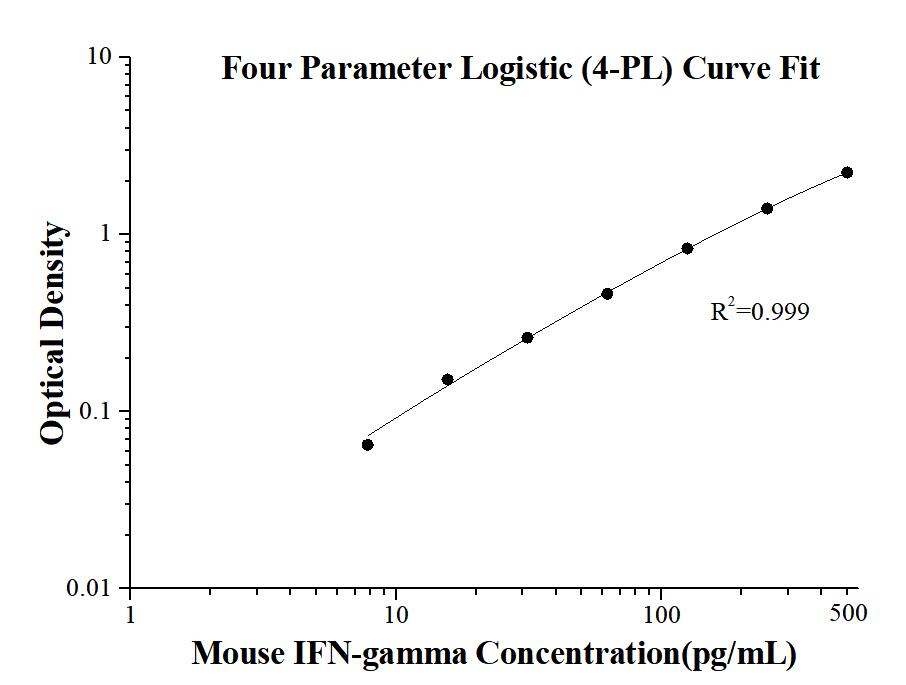Mouse IFN-gamma ELISA Kit
Cat no : KE10094
Synonyms
Ifg, IFN g, IFN gamma, Ifng, interferon gamma
Validation Data Gallery
Product Information
KE10094 is a solid phase sandwich Enzyme Linked-Immuno-Sorbent Assay (Sandwich ELISA). The Mouse IFN-gamma ELISA kit is to be used to detect and quantify protein levels of endogenous mouse IFN-gamma. The assay recognizes mouse IFN-gamma. An antibody specific for mouse IFN-gamma has been pre-coated onto the microwells. The mouse IFN-gamma protein in samples is captured by the coated antibody after incubation. Following extensive washing, another antibody specific for mouse IFN-gamma is added to detect the captured mouse IFN-gamma protein. For signal development, HRP-conjugated antibody is added, followed by Tetramethyl-benzidine (TMB) reagent. Solution containing sulfuric acid is used to stop color development and the color intensity which is proportional to the quantity of bound protein is measurable at 450 nm with the correction wavelength set at 630 nm.
| Product name | Mouse IFN-gamma ELISA Kit |
| Tests | 1 X 96 well plate |
| Sample type | Serum, Plasma, Cell culture supernatants |
| Assay type | Sandwich |
| Sensitivity | 0.16 pg/mL |
| Range | 7.8-500 pg/mL |
| Reactivity | Mouse |
| Tested applications | Sandwich ELISA |
| Gene ID (NCBI) | 15978 |
Recovery
| Sample Type | Average | Range |
|---|---|---|
| Mouse serum | 93% | 80%-106% |
| Cell culture supernatants | 97% | 79%-112% |
IntraAssay
| Sample | n | mean ( pg/mL) | SD | CV% |
|---|---|---|---|---|
| 1 | 20 | 248.9 | 5.7 | 2.3 |
| 2 | 20 | 57.1 | 1.3 | 2.3 |
| 3 | 20 | 13.5 | 0.6 | 4.3 |
InterAssay
| Sample | n | mean ( pg/mL) | SD | CV% |
|---|---|---|---|---|
| 1 | 24 | 254.9 | 11.5 | 4.5 |
| 2 | 24 | 60.0 | 1.5 | 2.6 |
| 3 | 24 | 14.5 | 0.5 | 3.3 |
Background Information
The IFNs were originally discovered as agents that interfere with viral replication. Initially, they were classified by the secreting cell type but are now classified into type I and type II according to receptor specificity and sequence homology. Interferon gamma (IFN-γ) is a soluble cytokine that is the only member of the type II class of interferons. It is secreted by Th1 cells, cytotoxic T cells and NK cells. The cytokine is associated with antiviral, immunoregulatory and anti-tumor properties and is a potent activator of macrophages. It plays crucial roles in pathogen clearance. Aberrant Ifng expression is associated with a number of autoinflammatory and autoimmune diseases. It has been identified in many studies as a biomarker for pleural tuberculosis (TB). Mutations in this gene are associated with aplastic anemia.
Properties
| Storage Instructions | All the reagents are stored at 2-8℃ for 6 months or -20℃ for 12 months. Refer to the protocol for further storage instructions. |
| Synonyms | Ifg, IFN g, IFN gamma, Ifng, interferon gamma |
Publications
| Species | Sample Type | Title |
|---|---|---|
Clin Transl Med Targeting KDM4 family epigenetically triggers antitumour immunity via enhancing tumour-intrinsic innate sensing and immunogenicity | ||
Chin Med Shaoyao Decoction reduced T lymphocyte activation by regulating of intestinal flora and 5-hydroxytryptamine metabolism in ulcerative colitis | ||
Vaccines (Basel) Comparative Evaluation of Recombinant and Acellular Pertussis Vaccines in a Murine Model | ||
J Pharm Pharm Sci Preparation, solubility, and anti-inflammatory effects of a complex of diphenylcyclopropenone/β-cyclodextrin derivatives as the treatment of alopecia areata | ||
Redox Biol EGCG drives gut microbial remodeling-induced epithelial GPR43 activation to lessen Th1 polarization in colitis | ||
Adv Sci (Weinh) EGR3 Inhibits Tumor Progression by Inducing Schwann Cell-Like Differentiation |
Reviews
The reviews below have been submitted by verified Proteintech customers who received an incentive for providing their feedback.
FH Flavia (Verified Customer) (04-11-2025) | The kit was easy to use and performed efficiently
|
